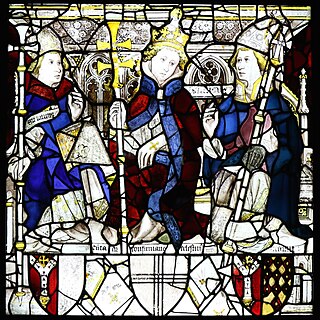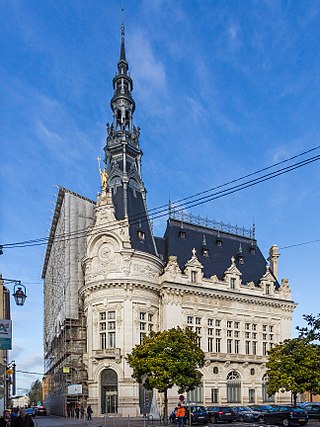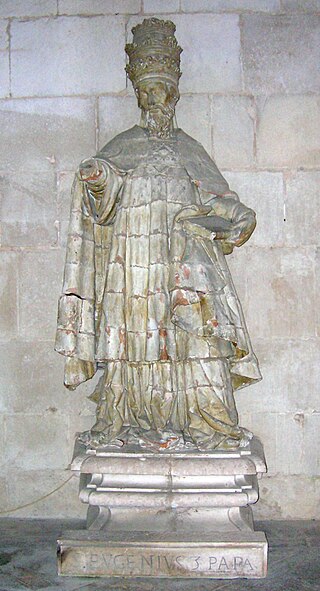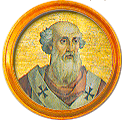
Bernard of Clairvaux, O.Cist., venerated as Saint Bernard, was an abbot, mystic, co-founder of the Knights Templar, and a major leader in the reform of the Benedictines through the nascent Cistercian Order.

Pope Celestine II, born Guido di Castello, was head of the Catholic Church and ruler of the Papal States from 26 September 1143 to his death in 1144.
Anacletus II, born Pietro Pierleoni, was an antipope who ruled in opposition to Pope Innocent II from 1130 until his death in 1138. After the death of Pope Honorius II, the college of cardinals was divided over his successor. Unusually, the election was entrusted to eight cardinals, who elected Papareschi. A larger body of cardinals then elected Pierleoni, which led to a major schism in the Roman Catholic Church. Anacletus had the support of most Romans, including the Frangipani family, and Innocent was forced to flee to France. North of the Alps, Innocent gained the crucial support of the major religious orders, in particular Bernard of Clairvaux's Cistercians, the Abbot of Cluny Peter the Venerable; and Norbert of Xanten, the Archbishop of Magdeburg who established the Premonstratensians and held a high rank in the court of the German Emperor Lothar III.

Sens is a commune in the Yonne department in Bourgogne-Franche-Comté in north-central France, 120 km from Paris.

Arnold of Brescia, also known as Arnaldus, was an Italian canon regular from Lombardy, who called on the Church to renounce property-ownership and participated in the failed Commune of Rome of 1144–1193.
There have been a number of councils held at Troyes:

Peter the Venerable, also known as Peter of Montboissier, was the abbot of the Benedictine abbey of Cluny. He has been honored as a saint though he was never canonized in the Middle Ages. Since in 1862 Pope Pius IX confirmed his historical cult, and the Martyrologium Romanum, issued by the Holy See in 2004, regards him as a blessed.
Robert of Melun was an English scholastic Christian theologian who taught in France, and later became Bishop of Hereford in England. He studied under Peter Abelard in Paris before teaching there and at Melun, which gave him his surname. His students included John of Salisbury, Roger of Worcester, William of Tyre, and possibly Thomas Becket. Robert was involved in the Council of Reims in 1148, which condemned the teachings of Gilbert de la Porrée. Three of his theological works survive, and show him to have been strictly orthodox.
Alberic of Ostia (1080–1148) was a Benedictine monk, diplomat and Cardinal Bishop of Ostia from 1138 to 1148. He was one of the most important people in the administration of Pope Eugenius III, especially due to his diplomatic skills.

The Diocese of Troyes is a Latin Church ecclesiastical territory or diocese of the Catholic Church in Troyes, France. The diocese now comprises the département of Aube. Erected in the 4th century, the diocese is currently a suffragan diocese in the ecclesiastical province of the metropolitan Archdiocese of Reims. It was re-established in 1802 as a suffragan of the Archbishopric of Paris, when it comprised the départements of Aube and Yonne and its bishop had the titles of Troyes, Auxerre, and Châlons-sur-Marne. In 1822, the See of Châlons was created and the Bishop of Troyes lost that title. When Sens was made an archdiocese, the episcopal title of Auxerre went to it and Troyes lost also the département of Yonne, which became the Archdiocese of Sens. The Diocese of Troyes covers, besides the ancient diocesan limits, 116 parishes of the ancient Diocese of Langres and 20 belonging to the ancient diocese of Sens. On 8 December 2002, the Diocese of Troyes was returned to its ancient metropolitan, the Archbishop of Reims. As of 2022, there was one priest for every 4,320 Catholics.
Eskil was a 12th-century Archbishop of Lund, in Skåne, Denmark.

The Archdiocese of Sens and Auxerre is a Latin archdiocese of the Catholic Church in France. The archdiocese comprises the department of Yonne, which is in the region of Burgundy. Traditionally established in sub-apostolic times, the diocese as metropolis of Quarta Lugdunensis subsequently achieved metropolitical status. For a time, the archbishop of Sens held the title "primate of the Gauls and Germania". Until 1622, the metropolitan archdiocese numbered seven suffragan (subordinate) dioceses: the dioceses of Chartres, Auxerre, Meaux, Paris, Orléans, Nevers and Troyes, which inspired the acronym CAMPONT. The Diocese of Bethléem at Clamecy was also dependent on the metropolitan see of Sens. On December 8, 2002, as part of a general reorganization of the dioceses of France undertaken, at least in part, to respond to demographic changes, the Archdiocese of Sens-Auxerre ceased to have metropolitan rank and became a suffragan of the Archdiocese of Dijon, which became the centre of a new ecclesiastical province for the Burgundy administrative region.
Arles in the south of Roman Gaul hosted several councils or synods referred to as Concilium Arelatense in the history of the early Christian church.
Henry of Marcy, or Henry de Marsiac, was a Cistercian abbot, first of Hautecombe in Savoy (1160–1177), and then of Clairvaux, from 1177 until 1179. He was created Cardinal Bishop of Albano by Pope Alexander III at the Third Lateran Council in 1179.

In 1148, a Council of Reims was called by Pope Eugene III to consider a variety of issues for the Church. Originally the summons to the council went out in October 1147 and it was supposed to be held in February 1148 at Trier, but conditions there were such that it was moved to Reims. A number of the bishops and other Churchmen who had been convoked did not attend and Eugene suspended many of the non-attendees, excepting the other Churchmen of Italy, who were excused. The council convened on 21 March 1148 and is said to have lasted 11 days in total, which would give an end date of 1 April 1148. However, it is possible that it was shorter, given that the large increase in the population of Reims would have strained the town's resources.

The Lateran Council of 769 was a synod held in the Basilica of St. John Lateran to rectify perceived abuses in the papal electoral process which had led to the elevation of the antipopes Constantine II and Philip. It also condemned the rulings of the Council of Hieria. It is perhaps the most important Roman council held during the 8th century.

Peter Abelard was a medieval French scholastic philosopher, leading logician, theologian, poet, composer and musician.
The Council or Synod of Soissons may refer to any of the following Catholic synods in Soissons, France:

The Council of Pisa, was convened by Pope Innocent II in May 1135. An extraordinary number of prelates, archbishops, bishops, monks, and abbots attended the council, including a large number of Italian clergy. The council addressed simony, schismatic clerics, heresy, as well as donations to the Templar Order. Pisa would be the third council Innocent would convene to address issues within the Catholic Church.












